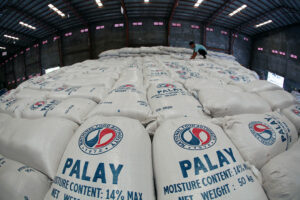By Adrian H. Halili, Reporter
THE Department of Agriculture (DA) said it has initiated the process of drafting legislation proposing to restore the National Food Authority’s (NFA) power to intervene in rice markets and regulate prices.
“We plan to submit our wish list to the Office of the President by Friday… I’m already asking our legal to draft the bill,” Agriculture Secretary Francisco P. Tiu Laurel, Jr. told reporters late Monday.
He added that the DA will also urge President Ferdinand R. Marcos, Jr. to certify the impending bill as urgent.
At a House committee hearing on Tuesday last week, Mr. Laurel said that reinstating the NFA’s regulatory powers could help control rice prices.
Republic Act No. 11203 or the Rice Tariffication Law of 2019 stripped the power of the NFA to import and directly sell rice. The law instead implemented tariffs on imported rice at 35% initially, and 15% currently. The collected proceeds fund the Rice Competitiveness Enhancement Fund to modernize rice farming.
“The NFA used to have the power to tell all the retailers that you must sell NFA rice at this price… we don’t plan to control (the market), we just want to provide an option to buy rice at (the government) price,” he added.
The law had also limited the NFA’s functions to procuring domestically produced rice to hold in reserve for calamities. It is required to maintain a rice inventory equivalent to about nine days’ demand.
“With just the right budget and the right policy that allows the NFA to sell its rice to intervene, that will be enough (to tame prices),” Mr. Laurel said.
According to DA price monitors, as of Dec. 14, a kilo of well-milled rice sold for between P40 to P52 in Metro Manila public markets, while regular-milled rice fetched between P40 and P48.
Asked to comment, Federation of Free Farmers National Manager Raul Q. Montemayor said granting the DA or the NFA the authority to intervene by releasing cheap rice stocks could lead to a decline in farmgate prices.
“NFA intervention must be limited to situations where prices go beyond established thresholds or triggers, limited to areas where these price spikes occur, and targeted towards poor consumers only,” Mr. Montemayor said via Viber.
“Under normal circumstances, there should be no need for the NFA to intervene,” he added.
He cited the cost of intervention and the possibility of leakage, or the improper release of rice into the wrong hands, but also the risk of depressing palay prices due to the presence of cheap NFA rice on the open market.
Former Agriculture Secretary William D. Dar said that the NFA must be given the responsibility to maintain a one-month rice reserve instead of nine days demand, through a higher budget.
“With that level it can sell its aging stock to its network of retailers at about P35 per kilo. Another option is to sell to KADIWAs at P35. NFA intervention can provide relief to consumers in a big way,” Mr. Dar said via text.
The DA’s current program for distributing subsidized well-milled rice to the general public is known as Rice for All in KADIWA ng Pangulo outlets, since expanded to selected public markets and train stations.
The Rice for All program currently sells well-milled rice priced for P40 per kilo, with Mr. Laurel saying the DA is seeking to lower the price by January.
“I think we can make it P38-P39 by January. But we need (more) outlets,” he added.

